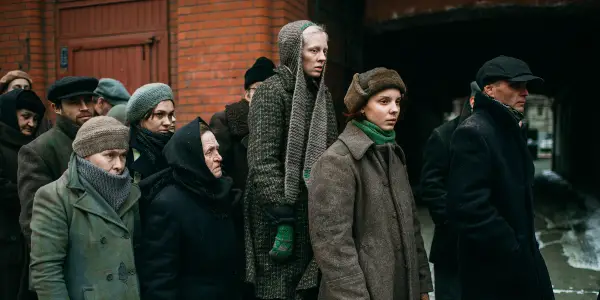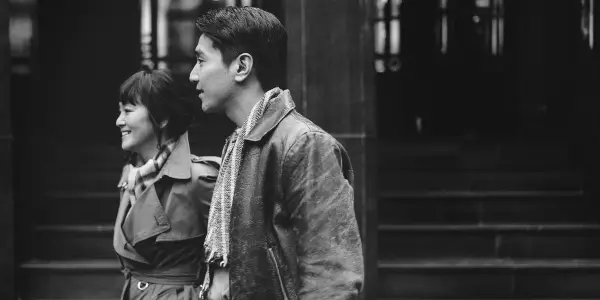NYFF 2019: SIBYL, BEANPOLE, & SATURDAY FICTION

Kevin L. Lee is an Asian-American critic, producer, screenwriter and…
Three films. Three different languages. One felt scandalously fun, another was one of the best films I’ve seen this year, and another was perhaps the biggest missed opportunity for a real historical premise.
Sibyl (Justine Triet)

I don’t think obsession and addiction has ever been this scandalous and fun. Sibyl opens with the titular character (Virginie Efira) making a decision – she leaves her psychotherapist job to resume her passion of writing. She says goodbye to most of her clients and things seem to be more relaxed now, but writer and director Justine Triet makes it clear to us there’s something still brewing under the surface for her. Then the situation gets more complicated when Margot (Adèle Exarchopoulos), a desperately troubled actress caught in an affair with her co-star, comes rushing for Sibyl’s help. As you would guess, Sibyl just cannot resist but to lend a helping hand.
And down the rabbit hole she goes. She goes further than any other therapist, or rational human being, would. She breaks all the rules in Therapy 101 and ignores all the red flags. Why? Perhaps it’s because she can use this case to shape her upcoming novel. Perhaps there’s something about Margot that she finds fascinating. Or perhaps it’s because Margot’s situation exposes some of her own dark tendencies.
Sibyl is not exactly a case of patient rehabilitation gone bananas so much as a tragic portrayal of a woman coming to grips with her addiction problems. The astonishing part is that Triet might have gotten away with having both plotlines in the same film. Admittedly, these two narratives don’t always mesh seamlessly. At one point, I was laughing while scratching my head over Sibyl and Margot’s situation getting more and more absurd. At another point, I was reminded of Denis Villeneuve’s Enemy, in that I felt as if I was living in the headspace of an unreliable protagonist. Both narratives, while entertaining and absorbing, act on completely different wavelengths when it comes to tone. It almost feels like two different movies clashing for attention.
Despite the tonal problem and the constant shift of focus, the film held my interest, largely due to the exceptionally absurd performances and Triet’s odd talent of juggling them all. Efira barely keeps it together upstairs (in a good way), demonstrating a range of emotions that go from confusion to drunken confidence. Exarchopoulos proves once again that she’s capable of having neck muscle spasms on command while crying. And then there’s Gaspard Ulliel as the co-star and Sandra Hüller as the clueless director of the film they’re shooting. Hüller alone may be worth the price of admission – she chews the scenery so hard in this, you’d wish you’re watching an entire film about her.
Maybe the constant flashback structure is not interesting. Maybe there is too much suspension of disbelief. Or maybe you could just not pay attention to these things and lighten up a bit.
Sibyl is a film made for that devil on your shoulder. It is an exercise in toying with that naughty side of us, that scandalous voice that needs a space to break free and be heard for a couple hours. On that front, Triet has undoubtedly succeeded. I found myself curiously drawn to her world from start to finish, laughing at her well-timed jokes and marveling at the goofy but composed performances. Though the film wobbles in the writing department, where the script is asking us to accept a lot, it managed to keep its balance and leave a lasting impression.
Beanpole (Kantemir Balagov)

Imagine walking into a film completely blind, not even knowing what language it is going to be in, and being gripped immediately during the opening credits, before you see a single shot. Russian filmmaker Kantemir Balagov pulls off this trick in Beanpole, because the first thing you hear instantly provides information about Iya’s condition.
Without warning and without control, Iya (Viktoriya Miroshnichenko) would freeze in place, unable to move or ask for help, other than make a chilling croak at the back of her throat. This is the result of her post-concussion syndrome, after fighting in the front-lines of the Second World War. We also learn in the same shot that everyone at the workplace, a hospital for wounded veterans, is aware of Iya’s condition, nicknaming her “Beanpole” for both her height and her stiffness when an episode occurs.
This effective form of minimal storytelling is found throughout Beanpole, a bleak yet tender look at broken lives in Leningrad, attempting to recover from physical and psychological fallout. Using exquisite period detail, Balagov sets characters, relationships, and implications of the past in place. You will not find better color composition and set design this year. Shots that are all green or all red actually take place in the same room – the wallpaper contains gashes of multiple colors, so it’s just a matter of which part of the wall Balagov wants in the shot.
The period detail extends to the film’s subplots, from potential love interests to a paralyzed soldier’s story and struggle with his wife. All build on top of one another to paint a heavy, layered portrait of post-WWII Leningrad. But Beanpole is, first and foremost, a story about a tender albeit toxic friendship between Iya and Masha (Vasilisa Perelygina), who fought alongside her during the war. Many actions they commit to each other throughout the film are abusive, destructive, and selfish in an animalistic nature. That being said, they only have each other, and the film gives us a chance to experience the highs and lows with them without a shred of judgment. In spite of the choices they make, we still wish for the two of them to make it, to get better.
Beanpole clocks in at 134 minutes, yet not a single minute was felt, due to the script’s ability to constantly change the characters’ situations. Balagov allows the camera to linger longer than usual via close-ups, and the actors are more than up to the task of letting their facial expressions guide us through their torment without actually saying anything. The subject matter can be so heavy at times that you would want to look away, but it’s all filmed with raw hypnotic power and beauty that you will find yourself under Balagov’s chokehold. This is easily one of the best films of the year.
Saturday Fiction (Lou Ye)

Based on the novels Death of Shanghai and Shanghai, Saturday Fiction takes place during Shanghai’s “Solitary Island” period, a time when the city was under Japanese occupation. Even though the events of the film occur before the United States stepped into World War II, the film itself is directed with the flavor of a Cold War thriller. Unfortunately, director Lou Ye blends way too much plot, style, and narrative threads that the end result becomes a messy, unfulfilling ordeal.
To start, it is difficult to figure out character backstories, motivations, and decision-making. The female lead Jean Yu (played very well by Gong Li) is both a famous actress and a double (maybe triple) agent spying for the Chinese and the Allies. With the film opening with Jean’s publicized return to Shanghai and everyone wondering why she’s back, you would expect a clear answer. Instead, the script offers three. Jean’s purpose in Shanghai ranges from rescuing her ex-husband to helping out a French Concession hotel to acting in a play that’s being directed by old flame Tan Na (Mark Chao).
The plot points become further complicated by the writing and Lou Ye’s directing style. Throughout the first and second acts, the film integrates the events of Tan Na’s play with reality. A scene will play out, and you’re left wondering if it was part of Jean’s espionage plan or if it was a moment in the play. Though I admired the talent behind the scene transitions and the attempt at surrealism, every emotional stake felt questionable and every plot point was in fear of being irrelevant.
It was not until the explosive third act where many moving pieces finally converged and things started to make some sort of sense. For a brief moment, Saturday Fiction became rightfully suspenseful and gripping. But before you get there, you have to sit through confusing plot threads, frustrating directing choices, and surprisingly irritating black and white cinematography that I found to be too handheld and disorienting. In the midst of all this, however, was a pair of excellent performances. Gong Li carried the entire film on her shoulders when she’s alone on screen, and her moments with Mark Chao did contain an intimate spark of romance.
Saturday Fiction could have worked as a straightforward but layered espionage story in the same vein as Bridge of Spies. Instead, the filmmakers tried to be clever, and as a result, they lost the plot – literally.
Does content like this matter to you?
Become a Member and support film journalism. Unlock access to all of Film Inquiry`s great articles. Join a community of like-minded readers who are passionate about cinema - get access to our private members Network, give back to independent filmmakers, and more.
Kevin L. Lee is an Asian-American critic, producer, screenwriter and director based in New York City. A champion of the creative process, Kevin has consulted, written, and produced several short films from development to principal photography to festival premiere. He has over 10 years of marketing and writing experience in film criticism and journalism, ranging from blockbusters to foreign indie films, and has developed a reputation of being “an omnivore of cinema.” He recently finished his MFA in film producing at Columbia University and is currently working in film and TV development for production companies.













